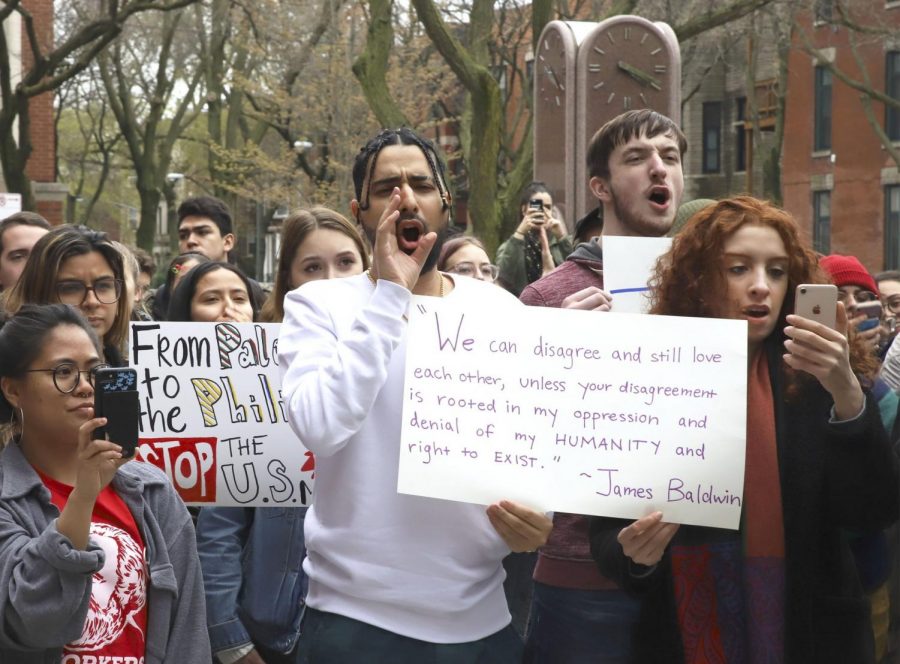Letter to the editor: Condemning Jason Hill’s comments condemns free-thinking
Xavier Ortega | The DePaulia for The DePaulia
Students protest Professor Jason Hill in May 2019 in response to his controversial statements on Palestine.
Editor’s note: The views expressed in this letter to the editor do not necessarily reflect the views of The DePaulia staff
In a recent article for The DePaulia, Professor Jason D. Hill is accused by a student of having made “transphobic statements” in classes and on Twitter. The writer says that the statements in question “may contradict the school’s discrimination and harassment policies.” This is a gross distortion of the conversation Professor Hill is trying to have. At no point has he belittled, denigrated or otherwise claimed subhuman status for LGBTQ people (conveniently forgotten, seemingly, is the fact that Professor Hill is an openly gay man). The Tweet in question merely states a position that the majority of Americans agree with.
The article says that a former student of Hill’s believes him to be “violently transphobic.” Strangely, the quote then concludes that Professor Hill merely raised, as a question in class, whether “a biological man could ever be a woman.” No violence seemingly occurred in this incident, which makes the entire accusation defamatory and slanderous. Further, it misunderstands what, as a philosopher, Professor Hill is supposed to do.
Traditionally, philosophers have suffered persecution for questioning certain taboos. Certainly, Meletus thought that Socrates was offensive for (allegedly) corrupting the youth and being impious towards the city’s deities. For those not in the know, Socrates was killed over this. If anything is universally mourned in philosophy, it is the martyrdom of Socrates that still brings tears to people in the field. Professor Hill asking the aforementioned question does not presuppose an answer-dialogue in the philosophical tradition has traditionally often ended without one. But being able to ask a question about the body, and what it means, and whether we must “be” something, or if we are capable, liberated by, or even, perhaps paradoxically, doomed to “become” another thing, is imperative to the tradition.
No evidence has been provided that Professor Hill wished to come to some sort of discriminatory answer. Asking the question opens up the playful potential for dialogue about how one can exist as a sexual entity in our world. It also opens up the potential for serious discussion of what identity can mean to people. In this case, the challenge of having this dialogue seems to be unmet, and with it, the wonderful possibilities for thought Professor Hill was attempting to get his students to engage with.
Of course, it is not this single accusation that raised attention. The tweet Professor Hill sent out on Jan. 21t is perhaps more central to the controversy at hand. In it, Professor Hill states: “Trans people should be treated with dignity. Agreed. Trans women ought not to be competing in sports with biological women. Why? Transwomen are still biological men with all the physical privileges of male strength. This move is misogynistic and a declaration of war against WOMEN”
While I disagree with Professor Hill, in the sense that I do not believe this is “misogynistic,” nor do I particularly care about this issue, there is a real discussion that must be had over this question. Currently, the students who have called for a rebuke of Professor Hill are unwilling to engage with, at the very least, a large portion of the populace that agrees with these sentiments. Is it really realistic to believe that most people, who do not have college degrees or have really ever been given the chance to think about these things, will come around simply because you condemned the statement of one professor? How does this look to those people? Does it look like you have an intelligent argument against him? Will trans people be freer because you are attempting to coerce Professor Hill out of his wrong-thought? The article quotes one person as saying they are “shocked that [Hill] still has a platform at DePaul” and that “there is a line crossed” by Professor Hill’s statements. I have on occasion been skeptical of persecution narratives, but how is this not a suggestion that Professor Hill ought to be persecuted for pursuing his line of thinking with honesty and rigor?
This gets me to my final point. Professor Hill has spent several decades thinking about the immense challenges and opportunities our complex, cosmopolitan world brings us. Having talked to Professor Hill in the past, and having listened to him lecture, I know that he comes out of a long tradition of radical thinking about the nature of rights, free association between people and the notion of a moral politics. If, through the study of Locke, Rousseau, and many others, he has come to this conclusion, then he is in fact doing what intellectuals have an obligation to the public to do: to explain what their thinking is and its practical implications to improve social life are.
If anything, there is a stronger case to be made that Professor Hill has shown that he is quite worthy of his professional role here at DePaul by honestly, openly and clearly expressing how he feels society ought to be, after following the logic of his own thinking. If intellectuals are unable to do this and they shut off or layer their statements in esotericism so as to avoid public controversy, there is little possibility that contributions to our national conversation and policy can be made by them.
There are many things to agree and disagree in good faith with Professor Hill on. People can question his statements on athletics policy just as much as they can question his views on complex geopolitical situations such as the one in Israel and Palestine, as well as his views on the moral nature of commerce and our civilization. Such is the role philosophy has.
It is disappointing to me to see him be smeared to such a degree in The DePaulia, and to have it be suggested he lose his earned ability to teach, due to his good-faith attempts to allow his philosophy to inform his political ideas, and transmit them to others.
The recent article on Professor Hill echoes past controversies, in which Professor Hill’s defense of Israel, and his assertion that the most moral outcome of the conflict would be the further expansion of Israel’s sovereignty over the West Bank, was attacked as “racist.” Very few, it seemed, were willing to even engage Professor Hill’s actual argument, which is that Israel, as an advanced, Liberal Democracy, has more moral value than the Palestinian Authority, which currently criminalizes homosexuality and in which Hamas has free reign to commit acts of terrorist violence. This is not, by any stretch of the imagination, a bad faith argument, or one that supposes that Palestinians are racially inferior.
Calling him racist in that instance, for following his own thinking, and “transphobic” in this, for engaging in dialogue and again following his own thinking, is hysteria, and such hysteria will not help us heal divides in our discourse. And healing is certainly necessary after this long and painful year.








FellowJudean / Feb 26, 2021 at 1:51 pm
Personally, I see nothing wrong with this “transphobic” rhetoric, but we do gotta crack down on freedom or we gonna have more of the QAnons showing up